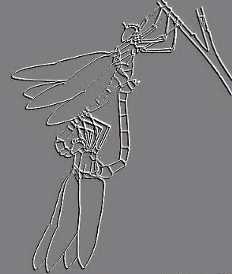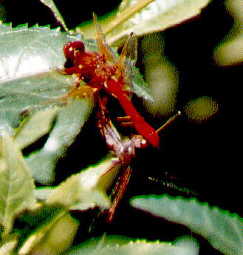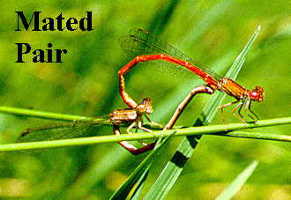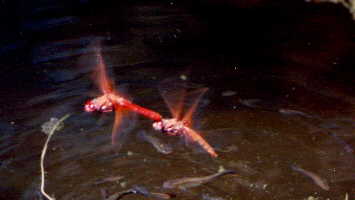

As sex is a very popular subject on the
Internet, Martin Peterson decided to include such a page at his Swedish dragonflies
site.
This article is directly quoted from his site with a few pictures thrown in to "spice things
up"! I think you will enjoy Martin's English and find him very knowledgeable on the
subject at hand!

As most animals dragonflies spend most of their time either eating or mating. The
male dragonflies have territories that they patrol by flying round in specific routes. If a
male dragonfly of the same species flies into this territory it will immediately be
rejected, sometimes really brutal. One can often see real air battles, with a little
imagination it looks quite like the world war one! Dragonfly males of other species are
either rejected or ignored, depending of size. Female dragonflies of the same sort are
paid great attention from the male, one can often see a female dragonfly with a "harem"
of males flying behind. As soon as the male gets the chance the copulating will begin.
 The dragonfly mating looks really curious as
the male dragonflies seems to be "wrongly constructed". As all other insects even the
male dragonflies have their genital opening at the bottom of the 9th segment of
abdomen, but the copulation organs are found at the second segment. Due to this the
male have to transport it's sperm from the end of the abdomen to the beginning of the
abdomen while bending the abdomen forwards. This is a very rapid operation, and
probably the transferred sperm will be sufficient for several copulations.
The dragonfly mating looks really curious as
the male dragonflies seems to be "wrongly constructed". As all other insects even the
male dragonflies have their genital opening at the bottom of the 9th segment of
abdomen, but the copulation organs are found at the second segment. Due to this the
male have to transport it's sperm from the end of the abdomen to the beginning of the
abdomen while bending the abdomen forwards. This is a very rapid operation, and
probably the transferred sperm will be sufficient for several copulations.
To mate, the male dragonfly grasps the female's neck with his anal appendages, raises his abdomen and invites the
female to bend her abdomen to join her genital opening with his copulating organ.
Together they form a heart-shaped "mating-wheel". This heart is probably the reason
for treating the dragonfly as a fertility symbol.
anal appendages, raises his abdomen and invites the
female to bend her abdomen to join her genital opening with his copulating organ.
Together they form a heart-shaped "mating-wheel". This heart is probably the reason
for treating the dragonfly as a fertility symbol.
The time of mating varies very much between different species of dragonflies, a
rule of thumb is that large dragonflies such as Aeshna mates a very short time (a few
seconds), and small dragonflies and damselflies such as Ischnura copulates long time
(several hours). The good flying dragonflies mates in the air, the less skillful ones
prefer to rest in the grass or on a stick while copulating. If those resting mating
dragonflies are disturbed during the mating process they fly away, still in tandem to find
a calmer place to continue the mating.
One very interesting thing is that for many dragonfly species, the males have
"spades" aimed for removing sperm that the female may have from previous
copulations with other males. In my opinion a very interesting way to favor the own
genes.
After the mating the female lays her eggs, some species just drops their eggs in
the water while other, specially damselflies lay their eggs in living plants such as water
lilies. A number of dragonflies still are in tandem during the  egg-laying. Then they fly together with synchronized wings, a great show!
I have seen a large numbers of Erythromma najas in tandem on a leaf of water lily.
Some of the pairs were copulating on the floating leaf and some were still in tandem
laying eggs in the stream, under the water surface! The damselflies stayed under the
surface for a very long time, at least half an hour!
egg-laying. Then they fly together with synchronized wings, a great show!
I have seen a large numbers of Erythromma najas in tandem on a leaf of water lily.
Some of the pairs were copulating on the floating leaf and some were still in tandem
laying eggs in the stream, under the water surface! The damselflies stayed under the
surface for a very long time, at least half an hour!
Some other dragonfly species, the females lays their eggs alone and a number of
them are defended by their male partner against other dragonflies.
The dragonflies often copulates with a great number of partners during their life. There is no faithfulness in the dragonfly world!

You are encouraged to visit Martin Peterson's Swedish
Dragonfly site and to email him and let
him know how much you enjoyed this article.